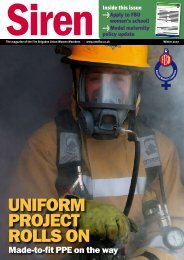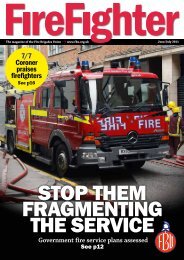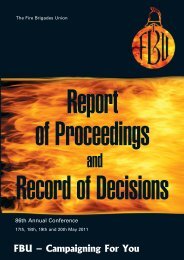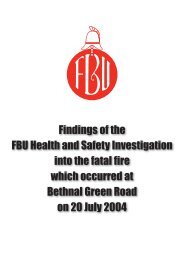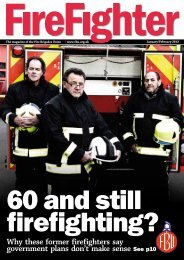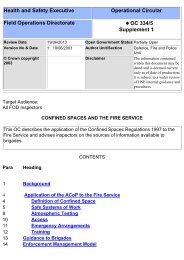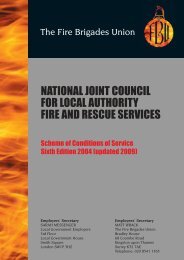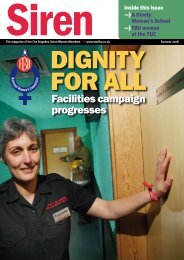Report - Fire Brigades Union
Report - Fire Brigades Union
Report - Fire Brigades Union
Create successful ePaper yourself
Turn your PDF publications into a flip-book with our unique Google optimized e-Paper software.
SECTION B — FIRE AND RESCUE SERVICE POLICY<br />
supporting structures. Indeed this work has identified<br />
general consensus that the worst approach the FRS in<br />
England could take to the challenge would be to continue<br />
to “salami slice” individually.<br />
The “big ticket” items are of course wholetime staff costs<br />
and the management and democratic overhead of having<br />
46 different services. It is important to note that several<br />
more factors have a bearing here in terms of government’s<br />
aspirations for public services:<br />
1 Government has been clear that individual authorities<br />
are sovereign and that achieving the savings and<br />
looking at areas such as the number of authorities and<br />
the degree to which joint working is undertaken is a<br />
local matter. Indeed savings are to be achieved while at<br />
the same time enhancing the role and involvement of<br />
communities and citizens in decision making and being<br />
more responsive to the needs and desires of individual<br />
communities.<br />
2 Employers are equally clear that individual authorities’<br />
sovereignty is paramount and that local choices will<br />
determine approaches to how savings are achieved.<br />
This at least gives a consistent view of where decision<br />
making is to be taken. What seems clear at the moment<br />
however is that this is leading generally to the “salami<br />
slicing” approach being taken. Some authorities are having<br />
to look at almost nuclear options to achieve savings, likely<br />
to have a disproportionate impact on prevention and<br />
protection, whilst those not affected to anything like the<br />
same degree are looking at much more modest change.<br />
What is arguably lacking is the collective motivation or will<br />
to look at making some of the changes that would drive<br />
out the existing inefficiency and duplication that exists<br />
across the Service, to the collective benefit of all.<br />
Principally this is looking at much more meaningful<br />
collaboration locally, the possibility of fewer authorities and<br />
an over-arching approach to delivering work that would be<br />
much better done collectively (but are not necessarily<br />
national functions).<br />
So the catalyst for change the Service might expect the<br />
Spending Review to be is actually diluted by the very<br />
uneven impact of funding reductions and the issues<br />
already covered. What might change this and produce a<br />
more consistent and progressive approach to meeting the<br />
Spending Review challenges?<br />
1 Removing barriers to change and giving authorities<br />
greater freedom to act will certainly help deliver local<br />
change.<br />
2 But this needs to be combined with incentivising more<br />
consistent change and change on a larger scale,<br />
addressing issues cooperatively with partners or<br />
collectively at a national level. The Service has<br />
previously responded well to this approach. Given the<br />
scale of the challenge, incentivisation should be<br />
targeted at things which will have the biggest impact.<br />
Incentivising local initiatives to build one new station to<br />
replace two existing stations, however beneficial<br />
locally, is not the right order of magnitude. Schemes<br />
which tackle bigger underlying inefficiencies, servicewide<br />
should be the focus.<br />
3 The Service itself needs to own this agenda and show<br />
a new level of cohesiveness.<br />
I am convinced that the Service can make the necessary<br />
change to deliver real savings and maintain or even<br />
improve the really excellent work it currently does in<br />
prevention and protection as well as emergency response.<br />
To do this local leadership and the workforce must be open<br />
to significant change in how services have been<br />
traditionally organised and delivered. The Service’s principal<br />
constituent bodies, supported by government, must<br />
generate the will and create the necessary structures for<br />
the Service to act together where it needs to do so. Those<br />
for whom the Spending Review outcome is less<br />
challenging must be incentivised to act collectively. If we<br />
fail to do this it may result in a minority of <strong>Fire</strong> and Rescue<br />
Authorities being forced into front line service cuts of a<br />
scale which could threaten the safety of communities. The<br />
sector and government has a joint responsibility to ensure<br />
that this does not happen.<br />
Early priorities<br />
● Government should ensure FRAs have the necessary<br />
powers to deliver efficiencies through the adoption of<br />
new local models including through joint delivery of<br />
services with other local providers;<br />
●<br />
●<br />
●<br />
●<br />
A sector owned joint procurement process should be<br />
developed;<br />
The FRS should fully engage with the LG Group<br />
Productivity Programme to drive down costs as well as<br />
supporting harmonisation in approach with other local<br />
public services;<br />
The Service should develop a VFM benchmarking and<br />
peer review model drawing on existing examples in<br />
other local government services;<br />
An invest to save fund for the FRS should be<br />
considered.<br />
Balance of resources<br />
● The latent resource capacity of the FRS should be<br />
maximised and used to extend the productivity of the<br />
Service – either through local models or enabling<br />
national change.<br />
Alternative models<br />
● If a local choice model is pursued this should be<br />
combined with a harmonised approach on some issues<br />
at an appropriate spatial level to deliver savings and<br />
maintain/enhance inter-operability.<br />
Asset management<br />
● Each FRA should ensure its Asset Management<br />
Strategy is clearly defined in the strategic responsibility<br />
42 FBU Annual <strong>Report</strong> 2011





